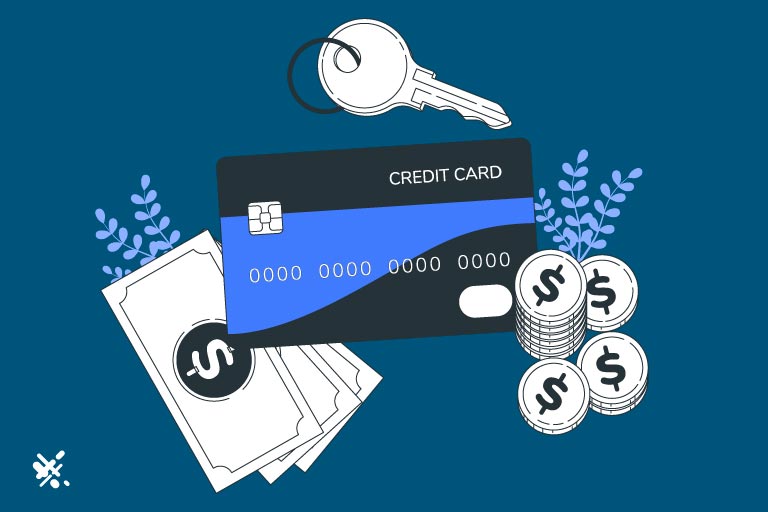Never mix business and pleasure, they say. And that’s precisely why you need to stop mixing up your personal credit with your business credit. The way to go about that is to structure your business as a separate entity on paper. Or in other words build business credit with your EIN.
That might be easy to see if your business has employees and a separate location from your home. But what if you’re a one-man operation and work from home? As it turns out, business structure (and business credit) has little to do with the reality you see around you. It has more to do with the paperwork on file.
Don’t take what you see for granted either. Because many small business owners with brick-and-mortar stores and even employees are still relying on their personal credit. That’s because they haven’t looked into how to start business credit with an EIN.
What is an EIN?
An EIN is an Employer Identification Number, also known as a Federal Tax Identification Number, or Federal Employer Identification Number. The IRS assigns this nine-digit number to every business operating in the United States. Each business has its own EIN, which helps Uncle Sam identify from whom he can collect that sweet cash.
But here’s the catch: businesses don’t get assigned an EIN unless they ask for one. Thankfully, to get an EIN you don’t need the assistance of a wizard, nor do you need to journey over a mountain pass, and there are no magic rings involved.
How Do I Get an EIN?
All you need to do is go on the good old interwebs and navigate your way willingly to the IRS website. There you can use their online application to secure an EIN for your business.
You will need to be a “responsible party.” Which in the parlance of the IRS, does not mean making all attendees hand in their car keys before unbottling a beer. Instead, it means that you are “the person who owns and can exercise ultimate control over the entity.”
To get an EIN, you will need to already have a number like an SSN (Social Security Number) or ITIN (for a resident alien). The person filling out an application must be an individual and not an entity. Some companies and lawyers can obtain an EIN for you. But the application is relatively painless. And doing so yourself might save a few hundred dollars.
I Have an EIN…So Now What?
Much like a mullet, good ownership is about business in the front and partying in the back (and by partying, we mean personal finances, credit, and tax returns). Unfortunately, not everybody likes the look of a mullet. Nor does every business owner structure themselves well for building business credit.
Around 73% of businesses are sole proprietorships, 8% are partnerships, 13% are S-Corporations, and nearly 6% are C-Corporations. Contrary to what you might have heard, every one of these business types can get an Employer Identification Number or EIN. Which is different from a social security number or an individual taxpayer identification number or ITIN.
First, let’s talk a little bit about what each of those business structures means.
Different Types of Business Structures
A Sole Proprietorship
A sole proprietorship is the default business structure according to the tax code. If you do any kind of work for business purposes, whether it’s designing a website, mowing a lawn, walking dogs, or filing tax returns, you are a sole proprietor. Unless you specify otherwise.
A Partnership
A partnership is a business you run with someone else (as you might have guessed). In a partnership, partners share liability for the business in addition to profits. This means that when it comes to business governance, decisions must be jointly made.
S-corporation
An S-corporation creates a separate entity for tax purposes. The owner of the business can put themselves on a payroll and pass the rest of their business income through as profit. Since profit is not subject to FICA taxes (unlike payroll) they can save a significant amount of money.
C-corporation
A C-corporation also creates a separate entity with a few key differences from an S-Corp. A C-corp can sell shares of stock to raise capital. But it must also adhere to more rules and formalities, such as having a corporate board.
Sole Proprietorship Vs C-corporation
Per the study cited above, most businesses in America are sole proprietorships. And since 99.9% of businesses are small businesses, most small business owners are actually sole proprietorships.
Sole proprietorships do have some advantages. There is definitely less paperwork involved. And of course, working for yourself perhaps commuting to the couch in pajamas and taking time off as you please is pretty awesome as well.
But sole proprietorships are missing out on some pretty big tax savings. All of their income is subject to FICA taxes. When combined with state and local taxes that can mean marginal tax rates surpassing 51% in some states.
Forming a corporation and limiting the portion of your revenue subject to FICA can result in lots of money saved. And to form a corporation, you need an EIN.
Do I Need an EIN?
What if you don’t care about paying FICA taxes? Of course, you should, so hopefully, this is just a rhetorical question that nobody will be answering. To be fair, there is some extra legwork involved in setting up an S-corp.
You’ll have to put yourself on a payroll. You’ll have to estimate quarterly taxes and pay them upfront. But in return, you could save thousands or tens of thousands of dollars on your income. But there is another reason for forming a separate entity on paper and that is credit reporting. An S-corporation gets an Employer Identification Number from the IRS.
As mentioned, even if you don’t want the accounting headache of an S-corp (which is really not that bad), and you want to retain your sole proprietorship, you can also get an EIN. But generally speaking, sole proprietorships cannot get a corporate credit card (more on that soon).
Partnerships (incidentally) are actually required to get an EIN, as are C-corporations. Mickey Mouse, Ronald McDonald, and the Pillsbury Doughboy have EINs or at least the corporations they represent do.
Do I Need an S-corp?
But wait…there’s more. Unfortunately, most banks offering small business cards or business loans are going to ask for an SSN when you apply for credit. Which means they will be checking your personal credit score and your credit history. In addition to the fact that this isn’t helping you keep your lines of credit separate, it’s not really helping you build a separate credit history for your business.
The reason banks do this is that (as mentioned) most small businesses are just that on paper. In practice, the person responsible for meeting business debt obligations is the same person responsible for meeting personal debt obligations. Which might conclude that they may even be paying them from the same checking account.
Take, for example, a fellow named Mario and his brother Luigi, who borrowed $100,000 for a service fleet of two vehicles. If business is bad one month and the two brothers have to decide between making their mortgage payment or the business loan for their vehicles, what do you think they’re going to do? Hint: they can’t get out of this by super-sizing with mushrooms.
Enter the Corporate Card
The solution to this problem is getting a corporate credit card. These types of credit cards can only be issued to corporations but that can include an S-corp. This rules out sole proprietors as applicants. If a sole proprietor applies for the so-called business credit cards that are marketed to banking customers, the application process will involve checking personal credit.
What you need to keep business and pleasure separate is a business credit card with EIN only for the application. And a corporation as well, even if it’s an S-corp of one person.
There will likely be some revenue and cash-on-hand requirements to get the corporate card of your choice. But this presents a bit of a catch-22 for most small and even midsize business owners. To borrow money, you’ve got to be making money and/or have piles of it like Scrooge McDuck.
If you think about it, this is also true for consumer credit cards. Although it’s one of the great ironies of credit, you do need to be making money and/or have money to borrow money.
So in this case, it’s really no different except for the fact that the lender has more at stake because the credit limits are bigger. They’ve really got to make sure their ducks or in a row for this type of lending activity. Actually, your ducks, not theirs.

Who Offers Corporate Credit Cards?
The same banks and card issuers that do consumer lending also offer corporate credit cards. The VISA Ramp Card is available to businesses with strong revenue and at least $75,000 cash on hand. The Divvy Card is a little more accessible. If you factor in revenue, history, business credit, personal credit, and cash on hand of at least $20,000.
A Brex Card is available to businesses that are funded by professional accredited investors (more on that momentarily) and have $50,000 cash on hand or $1,000,000 cash on hand if you are self-funded.
Accredited investors (if you’re wondering) are those who make $200,000 per year (or $300,000 if filing taxes with a spouse), have assets totaling more than one million dollars (excluding one’s primary residence), or have a valid Series 7, 65 or 82 license for trading marketable securities.
As you can see, obtaining a corporate credit card requires you to show that your business is successful. And in some cases (such as with the Divvy Card) your personal credit might come into play.
For these reasons, if you aren’t at the corporate credit card level yet, building up a reputation with regular small business credit cards might be a good way to start but in terms of separating business credit from personal credit, they’re the same as personal credit cards.
Secured Business Cards as a Way to Build Business Credit
So now we’re back to the original question…how to build up business credit with an EIN. There are secured business credit cards that can help you build business credit. Let’s take a look at a few of the more popular offerings:
The First National Bank Business Edition Secured Mastercard reports your activity to Dun & Bradstreet, one of the three main business credit bureaus (the other two being Experian and Equifax). This card does require a personal credit check and requires collateral up to $110,000 which in turn impacts the size of the credit line and does have a $39 annual fee.
Then there is the Bank of America Business Advantage Unlimited Cash Rewards Mastercard. There is a minimum $1,000 security deposit, which will in turn inform the size of your credit line. Eventually, after periodic reviews of your payment history, Bank of America may upgrade you to an unsecured card.
Plenty of other banks have secured business credit cards, as do American Express and Discover. But unfortunately, while activity on these cards may help your business credit develop, it also impacts (and is largely informed by) your personal credit score.
How Does a Business Credit Card Build Your Business Credit Score?
The impact of a business card affecting your business credit depends on the card issuer. American Express, Bank of America, CapitalOne, Chase, Citi, Discover, U.S. Bancorp, and Wells Fargo all reported activity on a business card to commercial credit bureaus.
And as a side note, only Amex, CapitalOne, Discover, and Chase report business card activity to consumer reporting bureaus, with some caveats at that (for example, only reporting negative information such as missed payments).
The primary cardholder is the one whose score will be impacted either way, whether in terms of commercial or consumer credit reporting. If your business card has authorized users (like employees), they will not have card usage impact their credit report.
That said, a business card can become a backdoor for building up business credit and a stepping stone toward a corporate card. Even though it will often require a personal guarantee and an individual SSN or ITIN to apply. But it is one of the main ways to establish business credit with a separate tax ID number.
The DUNS Number
But there is another way and once again, no wizards, mountain passes, or magic rings are required. As mentioned, there are three major corporate credit reporting bureaus: Experian, Equifax, and Duns & Bradstreet.
Duns in particular is responsible for issuing something called a Data Universal Numbering System number or DUNS number. This number can factor into negotiating contracts with suppliers and even some government contracts.
It’s important to note that a DUNS number is not the same as an EIN even though they both have nine digits. But a DUNS number can be associated with your business EIN instead of your personal social security number.
The DUNS number is correlated with something called a Paydex Score. Which basically tracks your payment history with vendors and suppliers. Paydex scores range from 1 to 100, with the top end of the spectrum indicating early payments and the bottom end indicating delinquency.
If you can get your suppliers to allow for Net-30 payments (e.g. giving you one month to pay) instead of COD (cash on delivery), this can allow you to make your payments as early as possible in terms of Paydex score calculations: 30 days in advance.
This in turn will increase your Paydex score a score that suppliers, vendors, and certain lenders will look at to assess the creditworthiness of your business.
However (as mentioned), a DUNS Number is not an EIN. You cannot use a DUNS to apply for a corporate credit card although certain lenders may look at this number to assess your creditworthiness as part of their application process. Even so, a DUNS number is an important part of building up business credit, especially in the B2B context.
And if a lender uses a DUNS number as a primary factor in getting your EIN approved for a business loan, then this too is a great stepping stone towards establishing business credit that’s not associated with your personal tax ID number.
Exceptions to the Rule
As you’ve seen, applying for a business credit card may be a stepping stone toward building a credit profile for your EIN. But they’re not really the main launchpad. There is, however, one EIN-only business card without cash flow requirements.
Speedway issues this EIN-only credit card. The Superfleet Mastercard can be used at over 39,000 Superfleet locations. You can apply for it with an EIN as long as you’ve been in business for three years.
But as you can see, that’s fairly limiting for business owners outside the Superfleet radius (although you can technically use it at other gas stations that accept MasterCard). There’s not much to say about EIN-only business credit cards except that the pickings are slim.
For instance, OfficeDepot, SamsClub, and Shell all offer business cards with an EIN-based application…but only if your business does $5 million in annual sales.

Corporate Credit is a Long Game
As you’ve probably realized by now, building up business credit associated with an EIN is hard work and there aren’t so many hacks. You can start by getting an EIN, forming a corporation, and building up some good payment history on a business credit card, along with getting a DUNS number.
From there, you’ll need to work your way up the food chain until you have sufficient cash reserves, good payment history, and substantial cash flow…which incidentally, are things you’ll need for a serious business anyway.
You could also explore getting a business loan from a lender that will use your EIN instead of your SSN or ITIN. But the pickings there may be as slim as they are in the plastic department. In those cases, however, you may be looking at different types of loans that may require collateral.
Which is a whole different can of worms. One reason why credit cards in particular are useful for building credit is that they are forms of revolving debt that often don’t require collateral.
Remember the old animal fable about the tortoise and the hare: the tortoise moves along slowly, but he wins the raise. Building good consumer credit takes time and patience that much more so for corporate credit.
The Benefits of Corporate Credit Cards
Once you reach that mountain peak, you’ll be happy you climbed. Corporate credit cards have a number of benefits for your business and you.
Corporate credit cards will not impact your personal credit score. Although, in some rare instances such as serious delinquency, they will. Payment history associated with the card is attributed to the corporation and its EIN, not your social security number.
Corporate credit cards also offer more robust reporting on spending and control over how the cards are used. Many corporate cards allow employers to set limits on the cards they hand out to employees. They also restrict certain types of purchases.

A Final Word About Building Business Credit with an EIN:
Building credit associated with an EIN is really about building corporate credit. This is next-level stuff for serious business owners with employees, cash reserves, and revenue surpassing seven figures.
Corporate credit is a useful tool that can assist in funding your ongoing operations, making it through lean times. Especially if you want to expand your business footprint. That said, even though the process of building up business credit associated with an EIN is a process, it’s well worth it. And necessary for growing your business.
To contact sales, click HERE. And to learn more about ECS Payment Processing visit Credit & Debit.
